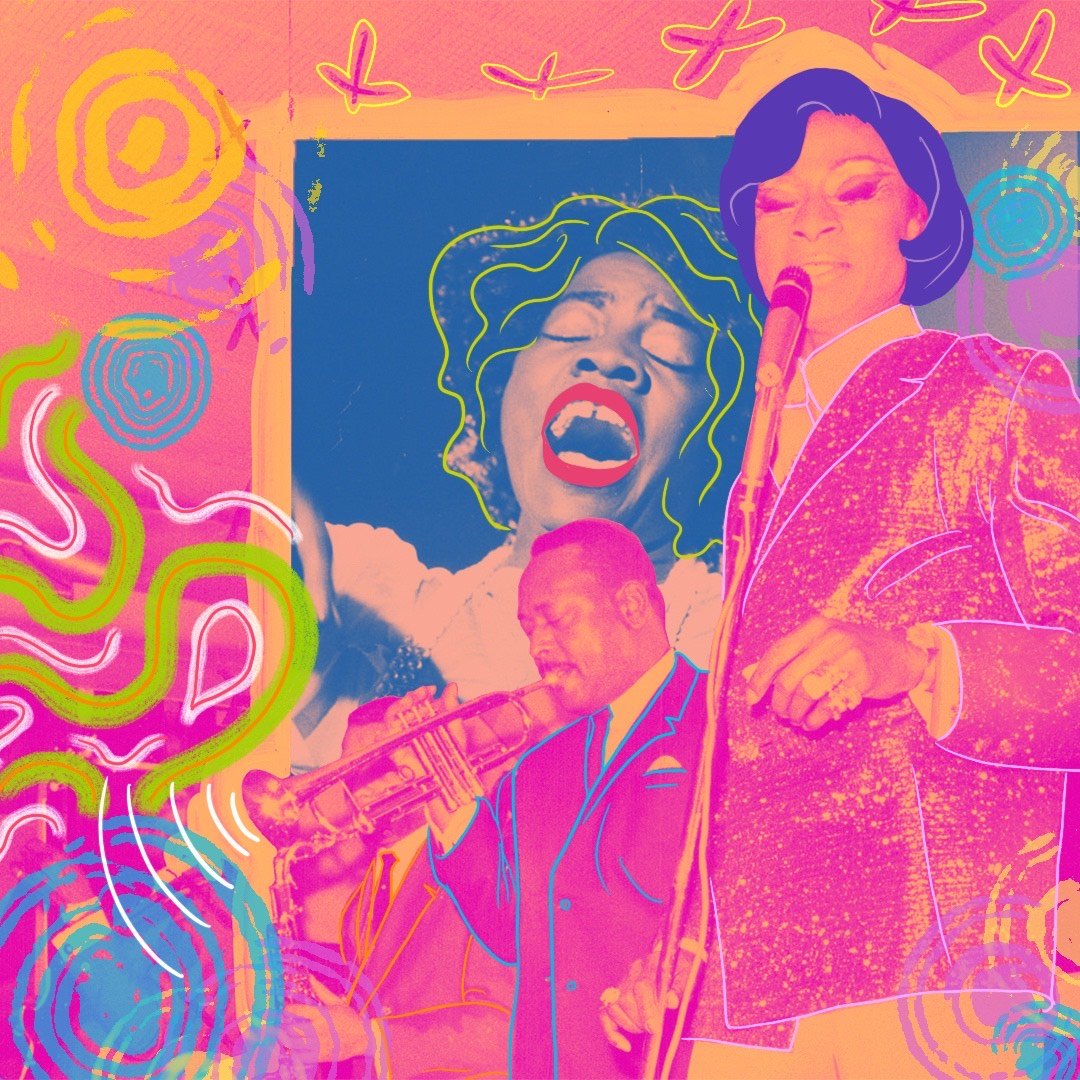Salome Bey and Jackie Shane’s Pioneer Work in the Canadian Blues Scene
Photo: Jeff Goode/Toronto Star/Getty Images
Design: Malaaya Adams
The Canadian blues scene was birthed in the 60s and delivered steady notes of emotional and harmonic Black voices. The blues’ range and resilience reflected those that carried the notes from flattened thirds to sevenths.
A Trailblazer to Note
American Black soul artists like John Ellison and Mel Brown came to Canada to expand their musical reach. But the artist palette was missing the Black woman’s soul and magic. Salome Bey entered the chat with her brilliance as “Canada’s First Lady of Blues.” With her brother Andy Bey and sister Geraldine Bey, they toured the U.S. and Europe as a vocal unit named Andy and the Bey Sisters.
Bey’s first appearance in Toronto was in 1961. Shortly after she settled there in 1964, her music career kickstarted, and she became a staple act within the city’s live music and musical theatre scenes. In 1970, Bey released her debut album and later recorded several others over the next three decades. Her appearances included Your Arms Too Short to Box with God, and this gave her a Grammy nomination in 1977 for Best Inspirational Performance.
Bey was made an honorary member of the Order of Canada for her legendary contribution to the Blues scene in 2005. After showing signs of dementia in 2004, Bey gave up performing due to Alzheimer’s Disease. On August 8, 2020, Bey died at the age of 86.
A Force of Nature
Aside from theatres, nightclubs and bars housed musicians like Bey. Toronto’s Yonge Street Strip was packed with taverns and musicians ready to calm rowdy crowds with a piece of their heaven. Each music venue housed a specific genre, and no lingering soul was left behind on the streets. The Colonial and Le Coq d’Or taverns were among the entertainment spots that buzzed with energy over headliners like Ronnie Hawkins.
Beyond the Yonge Street Strip, live music was still awake. The Holiday Tavern, southeast of Queen and Bathurst, and Ascot Hall at the corner of Keele and Annette was graced with a unique artist that bridged the pace of rock and roll with soul and R&B. Jackie Shane, a Black trans woman, graced the tavern’ stages with her performances. Yet, it wasn’t only her voice that attracted listeners.
Born in Nashville, Tennessee, Shane grew up in the evolution of the 40s and 50s rock and roll scene. She moved to Montreal in her late teens and joined an African-American musician Frank Motley, and his band ‘Motley Crew’ as a vocalist. Motley was famous for playing two trumpets at once. As a vocalist, Shane and the band racked up recognition in the nightclub circle.
As a performer, Shane often drew comparisons to Little Richard, known for her fiery performances, leaving audiences amazed and electrified. Shane was the consummate entertainer, often adorning the latest in fashion, wigs, makeup, silk, sequins and fur – pushing the boundaries of gender performance and sexuality.
With the clarity of hindsight, we can see the influence and importance of Shane, but during her time as a performer, she was often met with hostility. Unfazed, Shane challenged her hecklers on stage. She would include monologues in her musical acts to send a clear message that this is where she belonged and how she was going to use her stage. Shane didn’t conform to any structure, tone or narrative that the Blues scene would perpetuate.
In Motley’s corner, Shane recorded several singles and did a cover of William Bell’s “Any Other Way” with a twist on the original lyrics. This landed on #2 on the local CHUM radio charts.
In 1967, one of Shane’s performances at the Sapphire Tavern turned into a live album. With success on local charts, Shane shared the stage with greats like Etta James and Jackie Wilson. Shane left Canada’s music scene in 1971, and her hiatus left fans worried about her whereabouts.
Tending to personal matters, Shane’s name re-entered into the lights of stardom as a Chicago-based record label, Numero Group, released Shane’s anthology, and in 2018 it was nominated for a GRAMMY Award. With a wave of new fans and recognition, in an interview with CBC, Shane said, “I really feel that I have made a place for myself with wonderful people. What I have said, what I have done, they say it makes their lives better.”
Shane’s words captured her musical journey in the Canadian blues scene as her unwavering decision to be who she truly was attracted others to do the same. “One cannot choose where one is born,’’ she said, “but you can choose your home.”
Home for Shane was the first moment on a stage, the first time rushing between sets, and the first moment she sang from her soul. Her last moment was in her Nashville home. Shane died at the age of 76 in February of 2019.
Both musicians are the epitome of breaking the threshold and (re)living your most incredible moments in harmony with who you are destined to become. Their contribution to the Canadian blues scene attracted Black artists to tap into an industry that lacked representation and master their musical niche. Bey and Shane’s characters went beyond the musical space and impacted others to dance away their fears and listen to the sweet sounds of how powerful their voices truly are.

